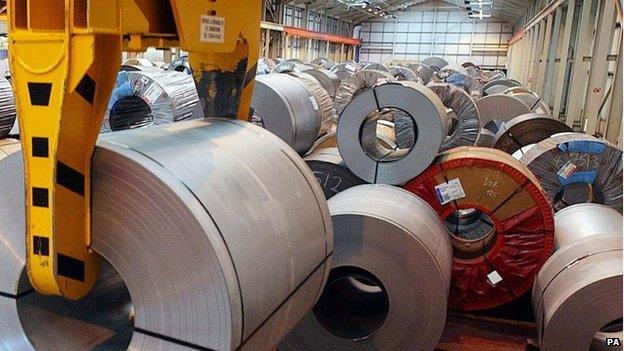Eurozone manufacturing growth remains 'meagre'
- Published

Growth in manufacturing in Germany, Spain and the Netherlands was offset by weaker output elsewhere
Eurozone manufacturing growth remained "meagre" in January as factories slashed prices at the fastest rate since mid-2013, a survey has said.
The latest rose to 51 in January from 50.6 in December.
Although this was only just above the 50 mark, which indicates growth, it was the strongest figure for six months.
Eurozone manufacturers are facing a duel problem of weak domestic demand and export performance, Markit said.
Cheaper goods
On Friday, official data showed deflation in the eurozone deepened in January with prices falling 0.6% in the month compared with a year earlier.
Markit's survey found the falling price of oil drove average manufacturing costs down at the fastest pace for five-and-a-half years.
Lower cost pressures were partly reflected in average selling prices. Output charges fell for the fifth month in a row and registered the biggest fall for more than a year and a half.
The survey was carried out before the European Central Bank (ECB) announced its ā¬1.1tn (Ā£820bn) bond buying programme, which Markit's chief economist Chris Williamson, said should boost business and consumer confidence in the eurozone and weaken the euro further, helping to boost exports.
The single currency has already fallen more than 6% versus the US dollar since the start of the year.
Mr Williamson said: "Eurozone manufacturing showed signs of pulling out of the doldrums at the start of the year, but the rate of expansion remained disappointingly meagre, vindicating the ECB's decision to take drastic action to revive the economy.
"The currency's fall should benefit exporting manufacturers in particular over coming months. Lower oil prices will also help reduce manufacturers' costs, with reduced fuel costs also freeing up more consumer income to spend on goods."
Mixed picture
Markit said improvements in business conditions were seen in Germany, Spain, the Netherlands and Ireland during January.
But this was offset by manufacturing downturns in France, Italy, Austria and Greece.
The rates of contraction in France and Italy stabilised, but Austria and Greece registered bigger downturns.
Italy saw a slight rise in output for the first time since September 2014, and the rate of decline in France was the weakest in the eight months.
But "the continuing slump in new orders to both nations may act as an ongoing headwind in coming months", Markit said.
Data from Germany, Europe's biggest economy, showed factory growth there was also slower than previously thought.
- Published30 January 2015
- Published28 January 2015
- Published6 January 2015
- Published23 January 2015